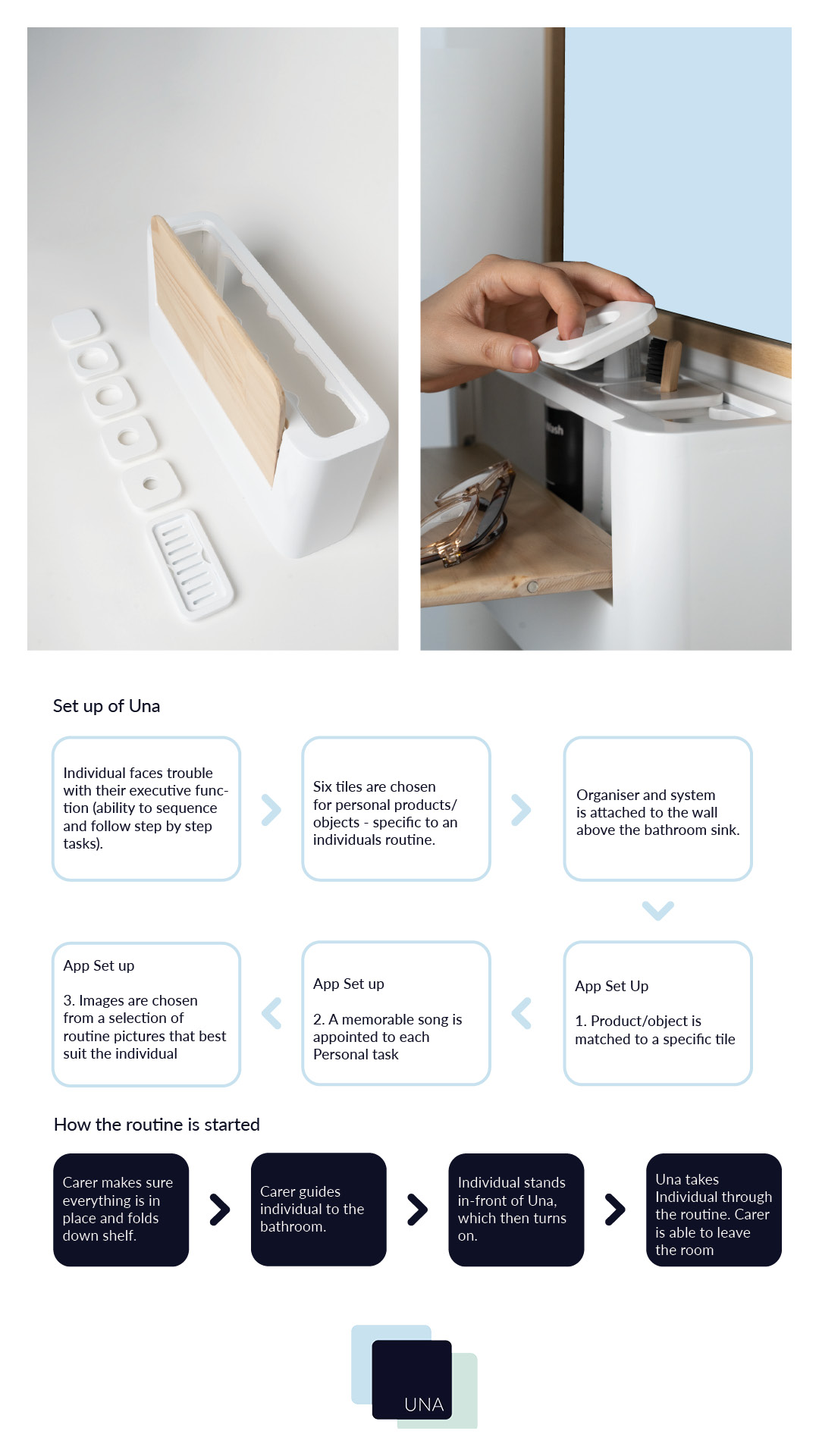
Alice Fisher
Una
LinkedIn - www.linkedin.com/in/alice-fisher-2020
Portfolio - https://indd.adobe.com/view/dccc2776-06ba-4af5-bfb9-9e66cb4dfbaf
App – Vimeo - https://vimeo.com/477307301
The system that takes an individual with dementia one step at a time.
The inability to sequence, plan and organise multi-step activities is a big challenge for those living with dementia. I identified the bathroom to be a frightening and confusing area due to the vast number of step-by-step tasks. Dementia results in a loss of independence which can create resentment, embarrassment and an undignified experience to routines as dependency grows.
Una is a product system that sits above the bathroom sink. This smart mirror and organiser combination works in sync to take an individual through a specific personal care routine. Through supportive technology, Una provides comfort by breaking down bathroom routines step by step.
I aimed to make the bathroom comfortable again. To enable rather than disable people living with dementia. Una encourages both the immediate carer and individual to feel confident through the transitional journey of dementia.
Imagine forgetting to perform an everyday task such as brushing your teeth.
This is known as ‘executive functioning’, which is the inability to perform tasks that require multiple steps. Una assists with this important challenge through step by step instructions.
Although there is no cure or prevention for dementia, the majority spend their journey living independently with support in their own home. Empathetic design can offer the opportunity to plan for the future and improve the quality of life. Currently, dementia design meets safety and functionality challenges. I aimed to design a solution for individuals living with dementia and their support person. To make assistance comfortable and dignified.
A prompting hierarchy can be used to understand what an individual may need at a specific stage of their journey. In early stages, to-do lists, pictures and simple text are ways to prompt an individual. The middle stages, an individual would require audio prompts. In later stages, the individual would be prompted with video and then full hand-on-hand assistance. At this stage, Una has been developed to address the early stages. It was important for Una to be introduced early to provide an opportunity to personalise the system with confidence. Adaptations can be distressing for an individual, introducing it early, gives the person time to familiarise themselves.
An individual would set up the organiser with their items. The smart mirror will then take an individual through a routine, highlighting what to use. Some people with dementia can sometimes get frightened of their reflection and not recognise themselves. To limit this, the digital screen will act as a mirror for the rest of the household and a full screen for the individual with dementia.
RFID tags will be used to allow the screen to identify what product is being picked up. Pressure sensors will recognise what is being pushed down (pump bottle). Proximity sensors will be used to help identify that someone is standing in front of Una.
Six different tile options offer those with dementia an opportunity to personalise their set up. Dementia isn’t the same for everyone; I wanted this to be reflected in my design. Through a modular solution, people can customise their experience.
The purpose of the shelf is to hide products when not in use to help with sensory overload. It also allows the individual to see all the products clearly when out. When folded up, Una reflects the maturity of the individual and isn’t something invasive or degrading for the whole household.
Song-task association proposes that memory could be supported by the association to short pieces of music. The individual with dementia will pair the song with a task in their early stages. This helps set up their future journey.
I used a high contrast on the app to meet the minimum contrast ratio of 7:1, which is recommended for elderly users. Blue and green colours have restful and calming effects.
People living with dementia can become so disconnected from this world. Una provides future-thinking to reconnect individuals through a system that doesn’t physically highlight their difficulties.




